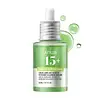What's inside
What's inside
 Key Ingredients
Key Ingredients

 Benefits
Benefits

 Concerns
Concerns

 Ingredients Side-by-side
Ingredients Side-by-side

Water
Skin ConditioningPropylene Glycol
HumectantAzelaic Acid
BufferingSodium Hydroxide
Buffering1,2-Hexanediol
Skin ConditioningCentella Asiatica Extract
CleansingDipropylene Glycol
HumectantButylene Glycol
HumectantPanthenol
Skin ConditioningHydroxyethylcellulose
Emulsion StabilisingGlycerin
HumectantEthylhexylglycerin
Skin ConditioningMelia Azadirachta Leaf Extract
Skin ConditioningSalicylic Acid
MaskingBiosaccharide Gum-1
HumectantAllantoin
Skin ConditioningDipotassium Glycyrrhizate
HumectantMelia Azadirachta Flower Extract
Skin ConditioningSodium Hyaluronate
HumectantMelaleuca Alternifolia Leaf Oil
AntioxidantSuccinic Acid
BufferingTotarol
AntioxidantBeta-Glucan
Skin ConditioningDextrin
AbsorbentTheobroma Cacao Extract
Skin ConditioningCentella Asiatica Leaf Extract
Skin ConditioningCentella Asiatica Root Extract
Skin ConditioningMadecassoside
AntioxidantAsiaticoside
AntioxidantAsiatic Acid
Skin ConditioningMadecassic Acid
Skin ConditioningTocopherol
AntioxidantSqualane
EmollientZinc PCA
HumectantChlorella Vulgaris Extract
Skin ConditioningCeramide NP
Skin ConditioningSodium Hyaluronate Dimethylsilanol
HumectantHydrolyzed Hyaluronic Acid
HumectantHydrolyzed Sodium Hyaluronate
Skin ConditioningHyaluronic Acid
HumectantPotassium Hyaluronate
Skin ConditioningHydroxypropyltrimonium Hyaluronate
Sodium Hyaluronate Crosspolymer
HumectantSodium Acetylated Hyaluronate
HumectantWater, Propylene Glycol, Azelaic Acid, Sodium Hydroxide, 1,2-Hexanediol, Centella Asiatica Extract, Dipropylene Glycol, Butylene Glycol, Panthenol, Hydroxyethylcellulose, Glycerin, Ethylhexylglycerin, Melia Azadirachta Leaf Extract, Salicylic Acid, Biosaccharide Gum-1, Allantoin, Dipotassium Glycyrrhizate, Melia Azadirachta Flower Extract, Sodium Hyaluronate, Melaleuca Alternifolia Leaf Oil, Succinic Acid, Totarol, Beta-Glucan, Dextrin, Theobroma Cacao Extract, Centella Asiatica Leaf Extract, Centella Asiatica Root Extract, Madecassoside, Asiaticoside, Asiatic Acid, Madecassic Acid, Tocopherol, Squalane, Zinc PCA, Chlorella Vulgaris Extract, Ceramide NP, Sodium Hyaluronate Dimethylsilanol, Hydrolyzed Hyaluronic Acid, Hydrolyzed Sodium Hyaluronate, Hyaluronic Acid, Potassium Hyaluronate, Hydroxypropyltrimonium Hyaluronate, Sodium Hyaluronate Crosspolymer, Sodium Acetylated Hyaluronate
 Reviews
Reviews

Ingredients Explained
These ingredients are found in both products.
Ingredients higher up in an ingredient list are typically present in a larger amount.
Azelaic acid is a multitasker ingredient that helps treat acne, pigmentation, and irritation. It is a great option for sensitive skin.
What makes azelaic special?
The best thing about azelaic acid is it's gentleness. It's generally well-tolerated and safe to use alongside other actives like niacinamide or salicylic acid.
Unlike AHAs, azelaic acid will not make you photosensitive/sun sensitive.
You can find this ingredient naturally occurring in grains like wheat, rye, and barley. In cosmetics, azelaic acid is typically lab-made, which is more stable and effective.
Learn more about Azelaic AcidCentella Asiatica Leaf Extract comes from the leaves of an herb plant native to Southeast Asia. Centella Asiatica is rich in antioxidants and amino acids. It can help reduce irritation and soothe the skin.
Many active components found in centella asiatica, such as Madecassic Acid and Asiaticoside, encourage the skin to naturally produce hyaluronic acid. This helps keep our skin hydrated. Many of these components also show antioxidant activity and may help reduce the signs of aging.
Research shows centella asiatica can help increase Type I collagen production by increasing fibroblast production. Fibroblast helps form connective tissue.
The combination of all these properties makes centella asiatica leaf extract effective at soothing the skin.
Other components of centella asiatica leaf extract include Vitamin A, vitamin C, several B vitamins, and Asiatic Acid.
Recent studies found madecassoside may help prevent damage from UV rays by preventing UV-induced inflammation. Further research is needed.
This plant has been used as a medicine and in food for many centuries. As a medicine, it is used to treat burns, scratches, and wounds.
Learn more about Centella Asiatica Leaf ExtractEthylhexylglycerin (we can't pronounce this either) is commonly used as a preservative and skin softener. It is derived from glyceryl.
You might see Ethylhexylglycerin often paired with other preservatives such as phenoxyethanol. Ethylhexylglycerin has been found to increase the effectiveness of these other preservatives.
Glycerin is already naturally found in your skin. It helps moisturize and protect your skin.
A study from 2016 found glycerin to be more effective as a humectant than AHAs and hyaluronic acid.
As a humectant, it helps the skin stay hydrated by pulling moisture to your skin. The low molecular weight of glycerin allows it to pull moisture into the deeper layers of your skin.
Hydrated skin improves your skin barrier; Your skin barrier helps protect against irritants and bacteria.
Glycerin has also been found to have antimicrobial and antiviral properties. Due to these properties, glycerin is often used in wound and burn treatments.
In cosmetics, glycerin is usually derived from plants such as soybean or palm. However, it can also be sourced from animals, such as tallow or animal fat.
This ingredient is organic, colorless, odorless, and non-toxic.
Glycerin is the name for this ingredient in American English. British English uses Glycerol/Glycerine.
Learn more about GlycerinSodium Hyaluronate is hyaluronic acid's salt form. It is commonly derived from the sodium salt of hyaluronic acid.
Like hyaluronic acid, it is great at holding water and acts as a humectant. This makes it a great skin hydrating ingredient.
Sodium Hyaluronate is naturally occurring in our bodies and is mostly found in eye fluid and joints.
These are some other common types of Hyaluronic Acid:
Learn more about Sodium HyaluronateSodium Hydroxide is also known as lye or caustic soda. It is used to adjust the pH of products; many ingredients require a specific pH to be effective.
In small amounts, sodium hydroxide is considered safe to use. However, large amounts may cause chemical burns due to its high alkaline.
Your skin has a natural pH and acid mantle. This acid mantle helps prevent harmful bacteria from breaking through. The acid mantle also helps keep your skin hydrated.
"Alkaline" refers to a high pH level. A low pH level would be considered acidic.
Learn more about Sodium HydroxideWater. It's the most common cosmetic ingredient of all. You'll usually see it at the top of ingredient lists, meaning that it makes up the largest part of the product.
So why is it so popular? Water most often acts as a solvent - this means that it helps dissolve other ingredients into the formulation.
You'll also recognize water as that liquid we all need to stay alive. If you see this, drink a glass of water. Stay hydrated!
Learn more about Water